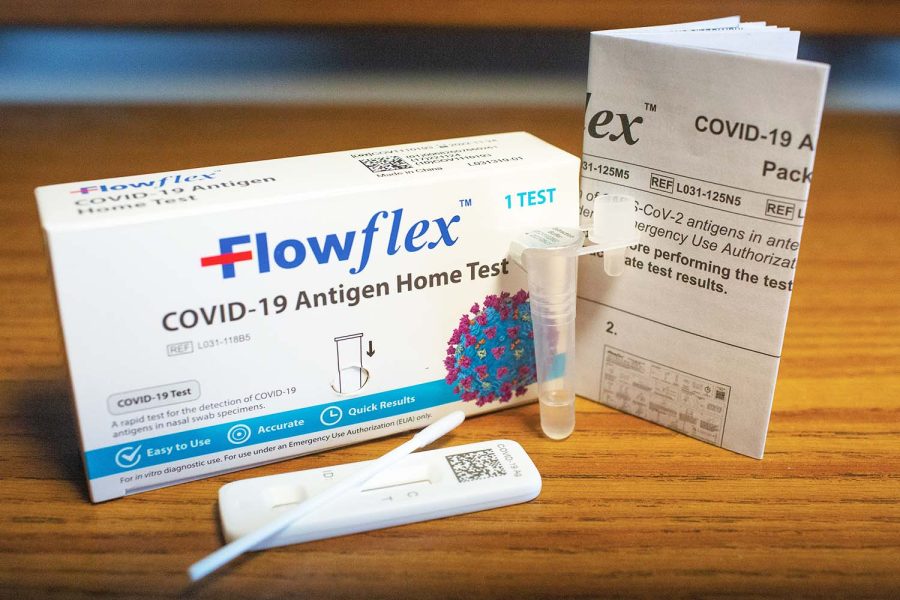UI expands COVID-19 testing for students with at-home tests
The University of Iowa is providing free, at-home COVID-19 tests to students at multiple locations across campus.
Photo illustration by Lillie Hawker.
January 30, 2022
The University of Iowa has expanded COVID-19 testing availability for students.
The university purchased thousands of tests to expand options and capacity among students across campus, Undergraduate Student Government President Regan Smock said.
Angie Reams, UI associate vice president and dean of students, wrote in an email to The Daily Iowan that, because rapid antigen tests for COVID-19 have become more available, the university opted to increase access to them for students.
“Students can pick up a free take-home COVID-19 test kit at the Welcome Center in the Iowa Memorial Union, at Student Health locations in the IMU and at Westlawn, or at the front desk of their residence hall,” Reams wrote.
Students are asked to pick up one testing kit at a time, Reams wrote.
The iHealth test kits, available at the Iowa Memorial Union, contain supplies for two rapid antigen COVID-19 tests.
The availability of third-party rapid antigen testing for students is a first among public universities in Iowa. Students at Iowa State University and the University of Northern Iowa can only pick up TestIowa kits on their campuses, which may take more than 24 hours to deliver results.
Increased testing availability does not extend to staff and faculty, Reams wrote. Instead, she said staff, faculty, and students can all order free at-home tests through TestIowa or the federal government website.
The UI reported 81 new student and 52 new employee COVID-19 cases on Friday. There have been 2,808 cases among employees and students since the beginning of the academic year.
Smock said she believes the UI has provided reliable testing through the UI Hospitals and Clinics throughout the pandemic, but with the emergence of the omicron variant, she said those systems have become more strained when it comes to providing testing.
“I’ve heard from students, and from people in Iowa, that it’s just really hard to find a test right now,” Smock said. “I know that the take-home rapid tests are super exciting, but I feel like those have been really hard to come by as well.”
She said the UI has ordered “a ton” of at-home COVID-19 tests, and she hopes that the greater availability of these tests for students can help alleviate some of the stress on both individuals with exposure or symptoms of the virus and the hospitals and clinics in the area.
Smock said she believes the policies the UI has been able to employ within state law, such as providing at-home tests, have been done well and she hopes that tests are a “game-changer” for the spread of COVID-19 on campus.
“I think that within what we are able to do, we’re doing a really, really, really good job,” Smock said. “I think there’s certain limitations that have been put on us by our government that have made it hard to curb the spread.”
Johnson County Community Health Manager Sam Jarvis said the UI has been a tremendous partner to the county throughout the pandemic. He said it has been great to have as much of a testing capacity as possible in Johnson County with the recent surge of the omicron variant.
As of Jan. 25, Johnson County’s seven-day positivity rate is 26 percent, according to data from the Iowa Department of Public Health.
“We saw a high amount of use before the holidays, before going to events, before seeing a loved one who might be at higher risk for severe outcomes,” Jarvis said. “I think many appreciate being able to take a test that day, that moment, and be able to know with some assurance whether they’re COVID positive or not.”
Jarvis said at-home tests can be less sensitive to detecting the virus in asymptomatic individuals, but that’s not to say that they’re less valuable than a traditional PCR test.
“We hope that folks recognize when and how to use it best,” Jarvis said. “Certainly, the quickness of the result and the availability also play a factor. Testing is one of the layers of mitigation, and it’s a tool in everyone’s tool vault to be able to have so they know whether they’re ill or not.”





















